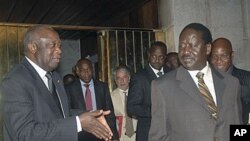The spokesman for incumbent Ivorian President Laurent Gbagbo’s government is questioning the rationale behind increasing sanctions against the administration by the international community describing it as punishing the victims of the violence perpetrated by the rebels.
Ahoua Don Mello says the European Union and the rest of the international community has refused to impose sanctions on the rebels, who he says have been committing atrocities by killing unarmed Ivorians in the ongoing political crisis.
“Everybody knows that the rebels are attacking the country every day, killing and destroying the north of the country [and] nobody takes sanctions against the rebels. But, what we observe now is that the sanctions are against the victims, but not those rebels who are killing the people in the country every day,” said Mello.
Some analysts say the European Union is considering renewed sanctions targeting Gbagbo and his close allies in an effort to force him to step down and cede power.
But, Mello says the international community, including the European Union, erred by refusing to listen to Gbagbo’s proposal to end the political stalemate.
“They made a big mistake because the country right now is divided into two parts; the north is under the control of the rebels and Mr. Ouattara and the south is in the control of Mr. Gbagbo and the national army. What is important is to create a dialogue between the two main persons in the country to rebuild the country,” said Mello.
“But, if you want to use sanctions, [or] you want to use military forces to force Gbagbo out that cannot solve the problem because Gbagbo is not alone, he is with all of the country,” he added.
Mello reiterates that an honest face-to-face dialogue between the internationally recognized President, Alassane Ouattara, and Gbagbo is, in his words, the only option to resolve the political stalemate.
“We are not bothered about sanctions. We are here in our country. What kind of sanctions can they take that we can’t go to Europe? We don’t need to go to Europe right now. We have a country. Those who want to see us we will go with them [and] those who don’t want to see us we can’t go with them,” Mello said.
“The violence is not the way to solve the crisis in Ivory Coast. This is not a good way. The rebels attacked the country in September 2002. In 2004, the French army attacked directly the country destroying all the heavy weapons of the country. But, they couldn’t force Mr. Gbagbo out. That means that violence is not the way to solve the problem,” he added.
Meanwhile, pro-Ouattara forces say they have launched offensives in the west, east and center-west of the country.
The pro-Ouattara fighters say they opened up new frontlines Monday against Gbagbo forces in the center-west town of Daloa and near the eastern town of Bondoukou.
Intense fighting broke out earlier Monday in the western town of Duekoue, a strategically important town that has long been held by pro-Gbagbo forces.
The Ouattara fighters say they have captured the town, but Gbagbo forces say it has not yet fallen.
Gbagbo has defied intense international pressure to turn over power to Ouattara, who the United Nations and African Union recognize as the winner of last November's presidential election.




